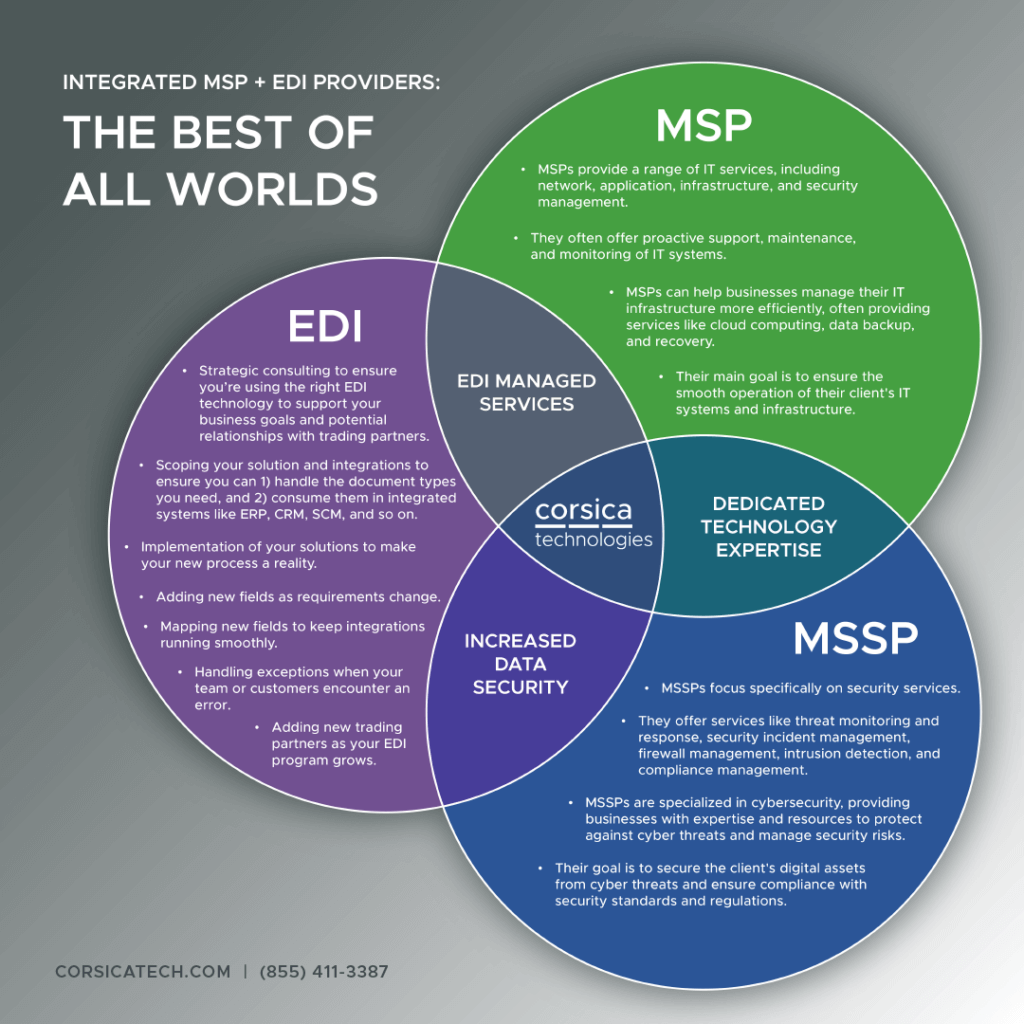It takes serious technology to stay competitive in today’s business climate. From IT to EDI, it’s tough for internal teams to manage it all—which is why companies turn to technology service providers.
Broadly speaking, there are three main types: MSPs (managed IT service providers), MSSPs (managed cyber security service providers), and specialist service providers. MSPs and MSSPs are traditionally responsible for many of the same systems—networks, servers, end user devices, email, cloud systems—but in different ways. MSPs manage and support these systems, while MSSPs secure them.
Specialist providers, on the other hand, typically manage a business-critical system like EDI or B2B ecommerce. They may also handle the integrations between these systems. Service quality may vary greatly between different providers. When it comes to EDI in particular, it’s tough to find a partner who offers a high level of service.
In this article, we’ll unpack the differences between these types of providers. We’ll also examine options for bringing all these functions together in one technology partner—like we do here at Corsica.
MSP vs. MSSP vs. EDI provider in a nutshell

But wait! There’s more. We need to talk about MSP baggage. Yes, it’s real.
What about MSP baggage?
Before we get to the specific services provided by MSPs and MSSPs, we need to acknowledge the elephant in the room.
Some companies haven’t had a great experience with their MSP.
In fact, our clients sometimes come to us with baggage from their previous partner. They may have suffered from:
- Getting nickel-and-dimed on billing, with unpredictable support costs driven by the business’s changing needs in different seasons (i.e. getting billed by ticket count, workstation count, or some other arbitrary number).
- Feeling like the MSP is here to extract revenue when they should act as a true partner focused on mutual success.
- A reactive, break/fix mentality with no C-level direction or collaborative development of technology strategy.
- Slow response (or no response) on tickets, regardless of priority level.
- Entry-level technicians who can’t actually assist with complex technology issues.
- Lack of support for EDI and other specialized, business-critical technologies.
That’s the bad news. But what should companies look for in an ideal technology provider?

Fixing the managed services experience for all types of technology
Whether or not you have IT and cybersecurity staff, it shouldn’t be this difficult to succeed with technology. Your service provider should make life easier—not harder.
What does your best life look like in terms of technology services? Here’s what our clients say makes a great partner—whether we’re handling IT, cybersecurity, or both.
- Simple, predictable monthly pricing that doesn’t fluctuate based on changing totals of tickets, workstations, or other arbitrary numbers.
- A provider that acts as a true partner, putting your organization first and seeking mutual success.
- A deep bench of C-level expertise to help create a 3-year technology roadmap and provide essential strategic consulting.
- Respectful and responsive, putting people first at all times.
- A deep bench of technicians who have the experience necessary to solve your most complex technology issues.
- Expert support for EDI and essential data integrations, so you don’t have to play referee between different service providers who don’t care about mutual success.
In our opinion, this is the headline. The market for both MSPs and MSSPs has matured, which means most providers offer the same services on paper (except for EDI—we’re one of those rare MSP/MSSPs who also does EDI). But aside from actual services, it’s the intangible side—the quality of your experience and outcomes as a client—that makes all the difference. Here at Corsica Technologies, our goal is to fix the managed services experience by bringing next-level humanity and deep technical expertise to every technology initiative.
With that in mind, let’s break down the specific services of MSPs and MSSPs.
Specific services provided by MSPs
At a high level, MSPs focus on IT services. They typically operate as an extension of the organization’s IT department—or as the entirety of their IT department if the company doesn’t have staff resources.
In a nutshell, full-service MSPs generally provide these services (all of which we offer here at Corsica):
- Managed network services. This responsibility includes managing network devices like firewalls, switches, routers, and wireless access points. It should also include uptime monitoring as well as troubleshooting, support, and preventative maintenance.
- Managed server services. Your MSP takes responsibility for your servers, including uptime monitoring, troubleshooting, virtualization management, and OS management for supported systems. Full-service MSPs should also handle backup monitoring and remediation for your servers in case you experience a catastrophic data loss.
- Microsoft 365 and Active Directory management. It takes expertise to keep M365 synced with Active Directory. A good MSP should cover this service for you.
- Managed workstations. Your MSP should triage, troubleshoot, and quickly remediate any issues with workstations. Sophisticated remote access software allows your MSP team to see exactly what’s going on and address it without the need to be physically present.
- vCIO (virtual CIO) consulting services. If you have a CIO on staff, then you have the C-level guidance and thought leadership you need to make strategic decisions. However, many companies don’t have this expert on their executive team, so they rely on their MSP to provide strategic consulting on technology. This is one of the most powerful features of working with an MSP—especially if your provider collaborates with you to develop a 3-year technology roadmap. That’s our standard practice here at Corsica, and it helps our clients plan ahead for essential technology investments so there are no budgetary surprises.
What about cybersecurity, EDI, and data integration?
Some MSPs may claim to cover cybersecurity in addition to IT services. While some actually do, you should always read the fine print. It’s common to find MSPs that outsource cybersecurity to a third-party MSSP rather than handling it in-house.
These companies aren’t truly integrated providers. They’re MSPs who want your cybersecurity dollars too.
Of course, when it comes to EDI and data integration, good luck! These technologies don’t fall under the traditional remit of an MSP. If your provider doesn’t cover them, you’ll have to find a specialist to manage these technologies.
Unfortunately, that introduces new difficulties—like ballooning costs, a lack of coordination between vendors, and solutions that don’t take a holistic view. This is why we do it all here at Corsica—but we’ll get to that.

Specific services provided by MSSPs
MSSPs focus on protecting your systems from digital attacks. With career experts in cybersecurity on staff, MSSPs use powerful monitoring and remediation tools to stop cyberthreats in real time. Most MSSPs also provide C-level consulting from a vCISO (virtual chief information officer) who helps your organization make informed decisions about cybersecurity.
In a nutshell, full-service MSSPs generally provide the following—all of which we offer here at Corsica.
- Managed detection and response (MDR). This service combines endpoint detection and response (EDR) technology with an expert team providing constant monitoring and response for any cyberthreats.
- Information security policy library. Unless you have cybersecurity expertise on staff, you may need help developing policies like Acceptable Use, Access Control, Disaster Recovery, and so on. A comprehensive MSSP should offer templates that you can use as a starting point—either on your own, or in collaboration with your MSSP—to develop policies that fit the unique demands of your organization.
- Security information and event management (SIEM). This technology is essential to provide centralized log management and analysis of activity across your entire environment—for both on-premises and cloud-based systems. Network devices, servers, domain controllers, Microsoft 365, and more should all send log information to your SIEM. Of course, it’s not enough to have the software. You also need an expert team monitoring it, interpreting data, and responding 24/7.
- Security alerting and containment. If an incident occurs, who’s going to know? Who’s going to respond? And what takeaways can you find to prevent similar issues in the future? Services for security alerting and containment provide all this and more, conducted by career experts in cybersecurity.
- Secure internet gateway. This managed technology offers DNS-layer security that protects against internet threats. It allows your organization to secure branch offices and remote users who need access to your network. While it’s important to set up your gateway correctly, you can’t run it in “set it and forget it” mode. You need experts updating it to block new threats while also advising on policy changes that will keep you secure as the internet evolves.
- Dark web monitoring. If your information is for sale on the dark web, you may not find out until hackers purchase it and mount an attack. The best dark web monitoring services use a combination of automated search technology and insider information about recent hacks to conduct comprehensive monitoring. Of course, your MSSP should also notify you of breaches, educate your employees on password best practices, and help you respond if information is stolen.
- Phish testing and cybersecurity awareness training. People will always be the weakest component in your cybersecurity posture. Sophisticated phishing emails may pass even the best defenses, putting your employees on the front lines of cyber warfare. Luckily, you can address this weakness with a dedicated program of training and testing. The best MSSPs can provide this on a regular cadence that fits your organization’s rhythms.
- Email protection. Believe it or not, Microsoft 365 doesn’t have the most powerful defenses built in. Up to 65% of targeted spear phishing, social engineering, and other email-based attacks can reach your inbox in Outlook. This is why the best MSSPs offer next-level email protection driven by AI. Here at Corsica, our solution catches 99.9% of all malicious emails—with only a 1-in-a-million false positive rate.
- Managed patching (Windows and third-party). It’s tough to keep up with patches. While they may seem like an IT function, they have a direct impact on cybersecurity—which is why leading MSSPs include managed patching in their offerings. This ensures you have dedicated experts evaluating, approving, and applying the right patches to the right systems.
Services offered by EDI providers
EDI is not a set-it-and-forget-it technology. As integrated systems receive updates, EDI systems and their integrations must keep up. Whatever can break will break. It takes career experts in EDI to assess planned updates, test and configure new releases, and handle any break/fixes that still occur.
In a nutshell, EDI providers offer:
- Strategic consulting to ensure you’re using the right EDI technology to support your business goals and potential relationships with trading partners.
- Scoping of your EDI solution and integration to ensure you can 1) handle the document types you need, and 2) consume them in integrated systems like ERP, CRM, SCM, and so on.
- Implementation of your EDI solution and integration to make your new EDI process a reality.
- Adding new fields as your requirements change over time.
- Mapping new fields to keep your integrations running smoothly.
- Handling exceptions when your team or your customers encounter an error with EDI.
- Adding new trading partners as your EDI program grows.
Of course, most EDI providers will scope a project and write an SOW for tasks like adding new fields, handling exceptions, or adding trading partners. While this may be required in extremely complex scenarios, it’s more beneficial to find an EDI provider who offers one simple, monthly fee that can cover your ongoing EDI needs without unpredictable costs.
Hint: That’s one of our strong suits here at Corsica. You get unlimited service for EDI, cybersecurity, and IT—all for one predictable monthly fee.
Putting it all together: MSP vs. MSSP vs. EDI service provider
It’s rare to find a technology service provider who handles it all. In particular, EDI capabilities are tough to find in an MSP. This forces you to work with multiple partners—and it leaves you at the mercy of large EDI service providers, who are usually focused on their biggest customers.
Here at Corsica, we do it all. You get comprehensive services for IT, cybersecurity, EDI, data integration, and more—all for one predictable monthly fee. This empowers your team to get back to work, doing what they do best.

Want to learn more about MSPs, MSSPs, and EDI?
Reach out to schedule a consultation with our technology specialists.






